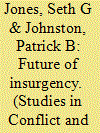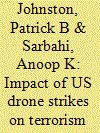|
|
|
Sort Order |
|
|
|
Items / Page
|
|
|
|
|
|
|
| Srl | Item |
| 1 |
ID:
112468


|
|
|
|
|
| Publication |
2012.
|
| Summary/Abstract |
Is killing or capturing insurgent leaders an effective tactic? Previous research on interstate war and counterterrorism has suggested that targeting enemy leaders does not work. Most studies of the efficacy of leadership decapitation, however, have relied on unsystematic evidence and poor research design. An analysis based on fresh evidence and a new research design indicates the opposite relationship and yields four key findings. First, campaigns are more likely to end quickly when counterinsurgents successfully target enemy leaders. Second, counterinsurgents who capture or kill insurgent leaders are significantly more likely to defeat insurgencies than those who fail to capture or kill such leaders. Third, the intensity of a conflict is likelier to decrease following the successful removal of an enemy leader than it is after a failed attempt. Fourth, insurgent attacks are more likely to decrease after successful leadership decapitations than after failed attempts. Additional analysis suggests that these findings are attributable to successful leadership decapitation, and that the relationship between decapitation and campaign success holds across different types of insurgencies.
|
|
|
|
|
|
|
|
|
|
|
|
|
|
|
|
| 2 |
ID:
120427


|
|
|
|
|
| Publication |
2013.
|
| Summary/Abstract |
What are key historical trends in insurgencies? And what do these finding suggest about the future of insurgency? We examine four aspects: causes of insurgency, outside support, strategies, and tactics. Based on an examination of quantitative and qualitative data, we make several arguments about the future. China could become increasingly involved in supporting insurgencies and counterinsurgencies if its economic and military power continues to increase and its global interest expands. In addition, insurgent groups will likely require less time to achieve high levels of sophistication for improvised explosive devices and other asymmetric tactics, which we expect they will use against more powerful mechanized counterinsurgent forces. We also expect that insurgent groups may take advantage of commercially-available technology to communicate, distribute propaganda, and recruit individuals. In addition, insurgents will likely make further use of encryption, anonymizing services, location-masking tools, and other related technologies to protect their online activities.
|
|
|
|
|
|
|
|
|
|
|
|
|
|
|
|
| 3 |
ID:
146194


|
|
|
|
|
| Summary/Abstract |
This study analyzes the effects of US drone strikes on terrorism in Pakistan. We find that drone strikes are associated with decreases in the incidence and lethality of terrorist attacks, as well as decreases in selective targeting of tribal elders. This matters for key ongoing debates. Some suggest that drone strikes anger Muslim populations and that consequent blowback facilitates recruitment and incites Islamist terrorism. Others argue that drone strikes disrupt and degrade terrorist organizations, reducing their ability to conduct attacks. We use detailed data on US drone strikes and terrorism in Pakistan from 2007–2011 to test each theory’s implications. The available data do not enable us to evaluate if drone strikes resulted in increased recruitment, but the data do allow us to examine if these strikes resulted in changes in terrorist activities. While our findings do not suggest long-term effects, the results still lend some credence to the argument that drone strikes, while unpopular, bolster US counterterrorism efforts in Pakistan.
|
|
|
|
|
|
|
|
|
|
|
|
|
|
|
|
|
|
|
|
|